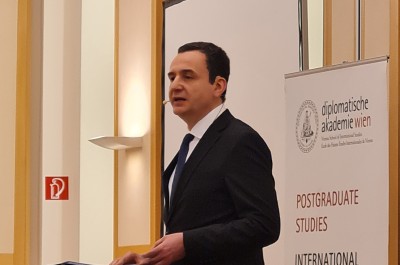Kosovo Prime Minister Albin Kurti Visited Vienna
Kosovo Prime Minister Albin Kurti visited Vienna, where he met with Austrian Chancellor Karl Nehammer and then held a speech at the Diplomatic Academy of Vienna in the evening.
 Kosovo Prime Minister Albin Kurti Holding a Speech at the Diplomatic Academy During his Visit in Vienna. / Picture: © Vindobona / Alban Ramadani
Kosovo Prime Minister Albin Kurti Holding a Speech at the Diplomatic Academy During his Visit in Vienna. / Picture: © Vindobona / Alban Ramadani
On Thursday, Kosovo’s Prime Minister visited the Austrian capital where Chancellor Karl Nehammer welcomed him. They talked about different topics such as increasing the presence of Austrian troops in Kosovo if KFOR, a NATO lead mission in Kosovo, decides to increase the troop numbers. Nehammer offered himself as an interlocutor between Kosovo and Serbia, where Austria can serve as a bridge of dialogue between the two countries, according to ORF. They both mentioned the good relations that Austria and Kosovo have.
As reported by ORF, in a joint press conference with the Federal Chancellor, Kurti confirmed his desire for an increase in the KFOR troop presence. The reason he gave was the tense security situation in the north of the country and the presence of pro-Russian forces in the region, such as the Russian mercenary group Wagner and the nationalist Russian motorcycle club Night Wolves.
According to ORF, Nehammer then reassured again Austria could be a bridge of talks between Belgrade and Prishtina and he ensured that Austria will provide support for Kosovo in its path to European integration. Kosovo has "used its time" and "achieved an incredible amount", for example in the fight against organized crime and corruption and through its commitment to the rule of law. This path was rewarded by the visa exemption in the EU in 2024.
Albin Kurti at the Diplomatic Academy
Later on, he held a speech with a following Q&A session at the Diplomatic Academy in Vienna. The speech was about the process of peace in Europe, Serbian disturbances in the north of Kosovo, and Russian aggression on Ukraine. He said, “Coming from a contested region and war-torn country, I witnessed the destructive hate against our people which culminated in ethnic cleansing and genocide by Serbian forces. Unavoidably, we ask ourselves, why did it happen again? How could we allow genocide to happen again in Europe? The answer, as complicated as we tend to see it, I believe is rather simple: It lies in the unwillingness to face the past and embrace the future”
He then continued “Instead, we see the glorification of war criminals, but also the glorification of an imperialist past, a return to a time of territorial expansion, of the past glory of power and domination over other (…) It also lies in the inability to accept the other as an equal human being. (…) Ideological differences such as race, religion, age, language, gender, and all that make us different from one another are then exploited to portray the other as the enemy. I do not believe that differences bring conflict, but their instrumentalization for political or economic gain turns them into conflict.”
He later proclaimed that the European peace process after World War II was only possible because the countries involved dealt with the past issues and moved forward. In the Q&A session after the speech, he was asked if he was surprised by the Russian invasion of Ukraine, he said that he was “shocked but not surprised” since Vladimir Putin had displayed some parallels with the President of Yugoslavia in the 90s, Slobodan Milosevic. When asked about the situation in the north of Kosovo, Kurti responded that they are in contact with the Serbian population, but they cannot make those contacts private, because every public interaction between the Serbs in Kosovo and the Kosovo government leads to Serbs “getting a phone call”. He emphasized that he had appointed Nenad Rasic as the minister of communities and returns of Kosovo to be in peaceful contact with the Serbian minority in the country.
Kurti also emphasized the country’s aspirations to become a NATO member and a member of the European Union. He also thanked Chancellor Nehammer for the warm welcome and Austria in general for helping Kosovo in times of need by e.g recognizing the Kosovar university diplomas in 1999. Kosovo officially submitted its EU membership application in December. The main obstacle is that five EU member states - Spain, Romania, Slovakia, Greece, and Cyprus - do not recognize Kosovo. Even Serbia does not recognize Kosovo's independence to this day. In 2008, with Western support, Kosovo declared its independence from Belgrade. The NATO-led protection force KFOR currently has around 3,800 members, including more than 400 Austrian soldiers.



